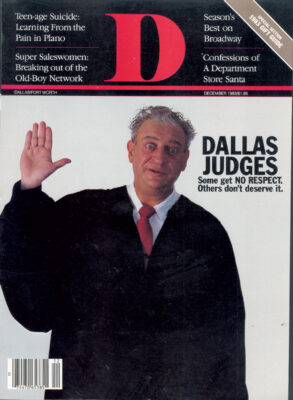FOR THE SECOND year running, I am being allowed to give my annual holiday warning: Keep your guard up. This is the time of year when we are supposed to let one wave of bonhomie after another roll over and engulf us. It’s the time of year when giving a turkey to an employee is supposed to create an unbreakable bond of gratitude. It’s the time of year when we say and have said to us, “We need to get together,” without believing it for a second. A possible remedy to these assaults on our good will is to think about people whose lives and examples matter to us. This exercise is not meant to lionize but merely to recognize those people who so successfully play the supporting roles in our individual existences. While you’re getting started, here are two people who exemplify what I mean.
During Chicago’s bitter mayoral race, Chicago Sun-Times columnist Mike Royko suggested that the Latin motto of the city be changed from Urbs in Horto (“City in a Garden”) to Ubi mea (“Where’s mine?”) in order to more accurately reflect the attitude of the Windy City’s citizenry. In spite of its Latin heritage, this “where’s-mine” attitude would be strictly Greek to Frances Conroy. She is the child of an era when obligations were met, not dodged. Her loyalty is uncalculated and instinctive, not considered. For more than 40 years, she has been secretary to Ralph Rogers, the chairman of Texas Industries. She has been right there with him through all the causes he has so effectively espoused. When I worked for him as his assistant, she helped me in the best kinds of ways to quell my quaking in his presence. She gently told me when to get my hair cut; she displayed his lack of enthusiasm for my ideas with kindness; and she helped me to gain confidence on my own-not at the expense of anyone else.
For years, she took thoughtful care of her mother and her aunt (the former was in her 80s; the latter, over 100) in her own home. Don’t mistake this for martyrdom; she didn’t. Families take care of families, Frances believes, so she took care of hers. But don’t mistake Frances Conroy’s approach to life as a grim allegiance to duty. It hasn’t been, and it isn’t. Her approach: You do what you can. She saved her money, and, I assume, when it appeared to be more than her own needs required, she quietly provided for a full professorship (in her mother’s name) at Southwestern Medical School.
Every once in a while, you encounter someone whose spirit you sense would be very hard to break. And in that very small class, Frances Conroy can take her place.
Tom Adams represents a heartening confluence of ability and lineage. One of his relatives, Samuel, is often cited as the father of the American Revolution; two other ancestors were elected president (John was the second; John Quincy, the sixth). Each of them would take pride in the reputation and affection that Tom has earned as a remarkable teacher of American and European history (as well as art history) at St. Mark’s School for Boys. One of his students, Kevin Teal, a black, who through his academic performance lapped the great majority of his privileged white classmates, is now at Princeton. Teal says he has yet to encounter any teacher there who measures up to Adams (whom he calls “The Hawk”). Teal remembers Adams’ ability to sense a student’s lack of preparation before a class even began. Adams would ask the most disconcerted student to give an overview of the previous night’s reading. As the boy stumbled, Adams would pick him and the class up. There was no malice involved, only a lesson to remind them of their obligation to him and, not incidentally, to themselves. Teal says that Adams made you feel his interest. He made you see the comparisons that give the study of history its vitality.
Great teachers are not without their quirks and eccentricities (my seventh-grade English teacher, for example, never blinked). As a teen-ager, Tom Adams taught himself to recite all of the train stops between New York and Chicago, the 32 points of the compass, the SO states and their capitals, the alphabet backwards, the books of the Bible and the presidents (in order)-all in less than a minute. He was a literate precursor of the Federal Express commercials. As St. Mark’s baseball coach, he has seen more than his share of misjudged fly balls, taken third strikes and missed signals. His historical perspective gives him the hope that a game without errors will one day come.
Teal especially remembers The Hawk- all 6 feet 4 1/2 inches of him-leaving his students on test days with the words, “I want you boys to be sharp today. I want you to be raaaaaazor sharp.” And to an extraordinary degree, his wish came true for more than 20 years’ worth of students.
Merry Christmas, Frances and Mr.Adams. And thanks.
Related Articles

Local News
As the Suburbs Add More People, Dallas Watches Its Influence Over DART Wane
The city of Dallas appears destined to lose its majority of appointments on the DART board. How will that affect the delivery of public transit in the future?
By Matt Goodman

Home & Garden
A North Haven Gardens Coach is Helping You Reap What You Sow This Spring
Seasonal tips from North Haven Gardens' Kay Nelson.
By Jessica Otte

Arts & Entertainment
WaterTower Theatre Invites Audiences Backstage for an Evening with Louis Armstrong
Terry Teachout’s first play, SATCHMO AT THE WALDORF, shares details about Louis Armstrong after one of his final shows.
By Brett Grega


